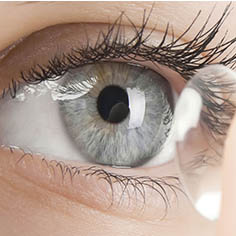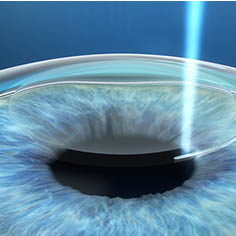01
Different ways to correct your vision

Glasses
Wearing eyeglasses is an easy way to correct refractive errors. Improving your vision with eyeglasses offers the opportunity to select from different types of lens options, frame designs and even lens coatings for various purposes.
There are two different types of eyeglass lens designs: single vision, an all-purpose lens designed to correct distance vision, and multifocal, designed to correct both distance vision and near vision (the upper portion is focused for distance vision, while the bottom portion is used for up close activities such as reading).
There are two different types of eyeglass lens designs: single vision, an all-purpose lens designed to correct distance vision, and multifocal, designed to correct both distance vision and near vision (the upper portion is focused for distance vision, while the bottom portion is used for up close activities such as reading).

Contact Lenses
Contact lenses are thin, clear disks of plastic that float on the surface of the eye. They correct vision like eyeglasses do and are safe when used with care. Contact lenses are used to correct the same conditions that eyeglasses do: myopia (nearsightedness), hyperopia (farsightedness), astigmatism (blurred vision due to the shape of the cornea) and presbyopia (inability to see close up).
Millions of people around the world wear contact lenses. Depending on your lifestyle, your motivation and the health of your eyes, contact lenses may provide a safe and effective alternative to eyeglasses when used with proper care and maintenance.
Millions of people around the world wear contact lenses. Depending on your lifestyle, your motivation and the health of your eyes, contact lenses may provide a safe and effective alternative to eyeglasses when used with proper care and maintenance.

Refractive Surgery
Refractive surgery is a method for correcting a refractive error. This surgical procedure is used to adjust your eye's focusing ability by reshaping the cornea. Other procedures involve implanting a lens inside your eye. The most widely performed type of refractive surgery are fotoablative procedures, where a laser is used to reshape the cornea.
Refractive surgery might be a good option for you if you:
Want to decrease your dependence on glasses or contact lenses;
Are free of eye disease;
Accept the inherent risks and potential side effects of the procedure;
Understand that you could still need glasses or contacts after the procedure to achieve your best vision.
Refractive surgery might be a good option for you if you:
Want to decrease your dependence on glasses or contact lenses;
Are free of eye disease;
Accept the inherent risks and potential side effects of the procedure;
Understand that you could still need glasses or contacts after the procedure to achieve your best vision.
02
Is Ortho-K right for you?
If you will answer YES to any of the following questions, click on the"Find a Specialist" tab to locate an EurOK Member Orthokeratologist near you.

- Do you wear glasses or contact lenses for nearsightedness, farsightedness, or astigmatism?
- Are you interested in LASIK but not quite ready?
- Are you unable to wear contacts due to allergies or other sensitivities?
- Are you tired of getting debris getting under gas permeable lenses?
- Do you feel contacts inhibit your ability to enjoy sports, working out, hiking, swimming, or skiing?
- Do your child's eyes require a stronger eyeglass prescription every year?
- Does your child need contacts but has trouble wearing or caring for them?
- Do you want to wake up during the night and see?


